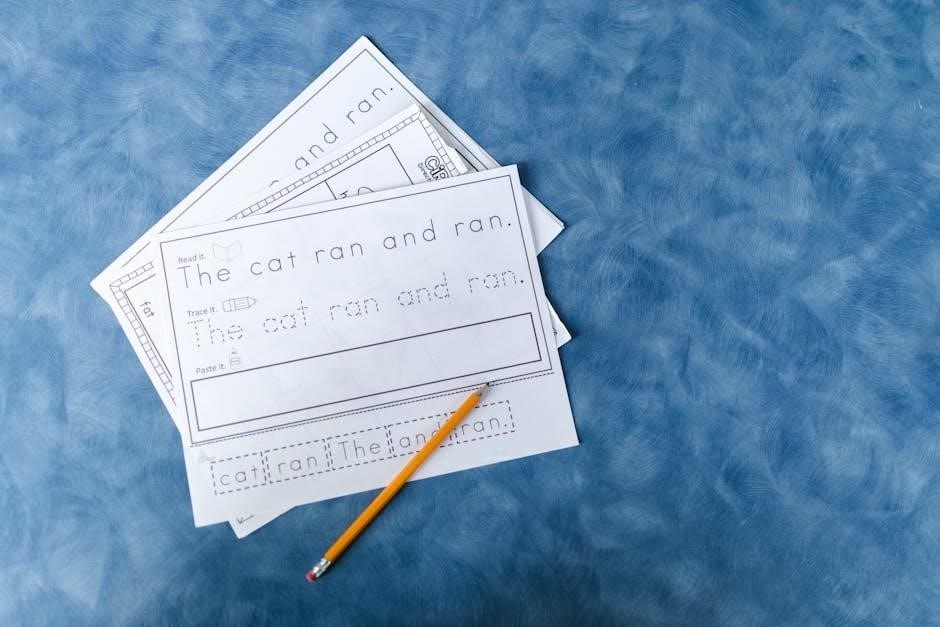Pre-algebra worksheets are essential tools for building foundational math skills. They offer a structured approach to learning algebraic concepts‚ equations‚ and functions. These resources are versatile‚ suitable for classroom use or independent study. With a focus on key topics like expressions‚ inequalities‚ and linear functions‚ they provide a comprehensive introduction to algebra‚ helping students transition smoothly to advanced math.
1.1 What Are Pre-Algebra Worksheets?
Pre-algebra worksheets are educational resources designed to help students transition from basic arithmetic to algebra. They typically contain exercises and problems that focus on building foundational math skills‚ such as working with integers‚ decimals‚ fractions‚ and exponents. These worksheets often include algebraic expressions‚ equations‚ inequalities‚ and word problems to introduce core algebraic concepts. Available in PDF format‚ they are printable and easily accessible‚ making them ideal for both classroom and home use. Pre-algebra worksheets cater to different learning styles and proficiency levels‚ ensuring students can practice and master essential math skills at their own pace. They are versatile tools for teachers and parents alike.
1.2 Importance of Pre-Algebra Worksheets
Pre-algebra worksheets play a crucial role in building a strong mathematical foundation for students. They provide structured practice‚ helping students transition smoothly from basic arithmetic to algebraic thinking. These worksheets are essential for mastering fundamental concepts such as algebraic expressions‚ equations‚ and inequalities. Regular use of pre-algebra worksheets enhances problem-solving skills‚ improves mathematical fluency‚ and boosts confidence. They also serve as valuable tools for identifying and addressing learning gaps early on. By reinforcing key math principles‚ pre-algebra worksheets prepare students for more advanced topics in algebra and beyond‚ ensuring long-term success in mathematics. Their versatility makes them ideal for both classroom instruction and independent study.
1.3 Benefits of Using Pre-Algebra Worksheets
Using pre-algebra worksheets offers numerous benefits for students. They provide a clear and organized way to practice essential math skills‚ fostering a deeper understanding of algebraic concepts. These worksheets help students develop problem-solving techniques and improve their ability to translate word problems into equations. Regular practice with pre-algebra worksheets enhances logical thinking‚ mathematical accuracy‚ and confidence. They also allow for independent study‚ enabling students to work at their own pace and review challenging topics. Additionally‚ worksheets provide immediate feedback‚ helping students identify and correct mistakes. Overall‚ pre-algebra worksheets are a valuable resource for building a strong foundation in algebra‚ making them indispensable for both teachers and learners.
Key Concepts Covered in Pre-Algebra Worksheets
Pre-algebra worksheets cover essential math concepts like algebraic expressions‚ solving equations and inequalities‚ working with variables‚ and operations involving integers‚ decimals‚ fractions‚ and percentages.
2.1 Algebraic Expressions
Algebraic expressions are fundamental in pre-algebra‚ involving variables‚ constants‚ and operations. Worksheets focus on translating word problems into equations‚ simplifying expressions‚ and solving for variables. They help students understand how to manipulate and evaluate expressions accurately. These exercises build a strong foundation for advanced algebra by introducing operations like combining like terms and applying order of operations. Regular practice with algebraic expressions enhances problem-solving skills and logical reasoning‚ preparing students for more complex math concepts. The worksheets also cover exponents‚ scientific notation‚ and ratios‚ ensuring a comprehensive understanding of algebraic principles. Mastering these skills is essential for success in higher-level mathematics.
2.2 Solving Equations and Inequalities
Solving equations and inequalities is a cornerstone of pre-algebra‚ teaching students to find unknown values and understand relationships between numbers. Worksheets often include one-step and two-step equations‚ such as 3x = 12 or x + 4 = 9‚ guiding students to isolate variables and verify solutions. Inequalities introduce concepts like <‚ >‚ and =‚ with exercises that may require graphing solutions or reversing inequality signs when multiplying by negatives. These skills are vital for real-world problem-solving‚ such as calculating distances or budgeting. Regular practice ensures students grasp these foundational algebraic principles‚ preparing them for more complex math challenges ahead.
2.3 Linear Functions and Graphs
Linear functions and graphs are fundamental in pre-algebra‚ introducing students to relationships that can be represented as y = mx + b. Worksheets often include identifying slope and y-intercept‚ plotting points‚ and determining equations of lines. Graphing linear equations helps students visualize how variables relate‚ reinforcing concepts like rate of change and independent/dependent variables. Practice exercises may involve creating tables of values‚ identifying patterns‚ and interpreting real-world scenarios‚ such as cost vs. time or distance vs. speed. These skills are essential for understanding more advanced algebra and real-life applications‚ making linear functions a critical area of focus in pre-algebra studies.
2.4 Polynomials and Systems of Equations
Polynomials and systems of equations are advanced topics in pre-algebra‚ introducing students to higher-level algebraic concepts. Worksheets typically cover operations with polynomials‚ such as adding‚ subtracting‚ and multiplying‚ as well as factoring simple expressions. Systems of equations are also explored‚ teaching students to solve for multiple variables using substitution or elimination methods. These exercises build critical thinking and problem-solving skills‚ preparing students for algebra and beyond. Practice problems often involve real-world applications‚ helping students see the practical relevance of these mathematical tools. Mastery of polynomials and systems of equations is crucial for progressing in algebra and tackling more complex mathematical challenges effectively.
2.5 Word Problems and Applications
Word problems and applications in pre-algebra worksheets bridge algebraic concepts with real-world scenarios‚ enhancing problem-solving skills. These exercises often involve translating sentences into equations and solving for unknowns. Topics include ratios‚ proportions‚ and geometry‚ with problems tailored to various grade levels. Worksheets frequently incorporate everyday situations‚ such as calculating distances‚ mixing ingredients‚ or budgeting money‚ to make learning practical and engaging. By practicing these problems‚ students develop the ability to interpret and solve mathematical situations they may encounter in life. This skill is essential for transitioning to higher-level algebra and applying math to real-world challenges effectively.
2.6 Basic Number Theory and Operations
Basic number theory and operations are fundamental in pre-algebra worksheets‚ covering essential concepts like integers‚ decimals‚ fractions‚ and exponents. These exercises focus on understanding factors‚ multiples‚ and divisibility rules‚ which are crucial for solving equations and inequalities. Students also practice operations such as addition‚ subtraction‚ multiplication‚ and division with various number types. Worksheets often include problems involving ratios‚ proportions‚ and percent‚ reinforcing foundational math skills. These problems are designed to build a strong numerical understanding‚ which is vital for advancing in algebra and higher-level mathematics. By mastering these basics‚ students gain confidence in manipulating numbers and solving practical problems effectively.

Finding Free Pre-Algebra Worksheets Online
Free pre-algebra worksheets are readily available online‚ offering a variety of topics like equations‚ inequalities‚ and functions. Popular platforms include Kuta Software and Infinite Pre-Algebra‚ providing printable PDFs for convenient practice. These resources cater to different learning needs‚ ensuring accessible and high-quality math education for students.
3.1 Popular Websites for Pre-Algebra Worksheets
Several websites offer free pre-algebra worksheets in PDF format‚ making them easily accessible for students and educators. Kuta Software and Infinite Pre-Algebra are highly recommended‚ providing customizable and printable resources. Math-Aids.com and Worksheet Genius also offer a wide range of topics‚ from basic operations to advanced algebraic expressions. These platforms allow users to download worksheets tailored to specific skills‚ ensuring targeted practice. Many of these sites are free or low-cost‚ making high-quality math education accessible to everyone. They are ideal for supplementary learning‚ homework assistance‚ or classroom activities‚ catering to diverse learning styles and proficiency levels.
3.2 Kuta Software and Infinite Pre-Algebra
Kuta Software and Infinite Pre-Algebra are renowned for creating high-quality‚ customizable pre-algebra worksheets. These tools allow users to generate worksheets tailored to specific topics‚ such as equations‚ inequalities‚ and functions. Infinite Pre-Algebra stands out for its ability to produce unique problem sets‚ ensuring endless practice opportunities. Both platforms offer free access to printable PDF worksheets‚ making them ideal for teachers and students alike. Their resources are organized by topic‚ providing focused practice for key pre-algebra skills. These tools are widely praised for their flexibility and effectiveness in reinforcing math concepts‚ making them indispensable for both classroom and home use.
3.3 Printable Worksheets in PDF Format
Printable pre-algebra worksheets in PDF format are a convenient and reliable resource for learning. These worksheets are widely available online and cover a variety of topics‚ such as algebraic expressions‚ equations‚ and functions. Many websites offer free PDF downloads‚ allowing students and teachers to access high-quality materials without hassle. PDF worksheets are ideal for printing and can be used in classrooms‚ homes‚ or tutoring sessions. They provide a structured way to practice and reinforce math skills‚ ensuring that students can work through problems at their own pace. With clear formatting and organized content‚ PDF worksheets are a popular choice for effective pre-algebra study sessions. They are easily accessible and adaptable to different learning environments‚ making them a valuable educational tool for all users.

How to Use Pre-Algebra Worksheets Effectively
Pre-algebra worksheets are most effective when used systematically. Encourage step-by-step problem-solving‚ review solutions regularly‚ and apply concepts to real-world scenarios for deeper understanding and skill mastery.
4.1 Step-by-Step Solving Techniques
Mastering step-by-step solving techniques is crucial for success in pre-algebra. Start by understanding the problem thoroughly‚ then break it into smaller‚ manageable parts. Identify the unknown variable and isolate it using inverse operations. For equations‚ simplify both sides first before solving for the variable. When dealing with word problems‚ translate the language into mathematical expressions. Practice applying these techniques consistently to build confidence and accuracy. Regularly review solutions to ensure correctness and learn from any mistakes. This methodical approach helps students develop a strong foundation in algebraic thinking and problem-solving skills.
4.2 Checking Solutions and Understanding Mistakes
Checking solutions and understanding mistakes are vital steps in the learning process. After solving a problem‚ substitute the solution back into the original equation to verify its correctness. This practice helps confirm that the answer is accurate and reinforces problem-solving skills. If a mistake is detected‚ analyze the steps taken to identify where the error occurred. Common errors include incorrect arithmetic‚ misapplying operations‚ or misinterpreting the problem. Learning from these mistakes enhances understanding and reduces recurring errors. Encourage students to review their work systematically‚ fostering a habit of thoroughness and attention to detail. This approach not only improves performance but also builds confidence in tackling more complex problems.
4.3 Encouraging Independent Practice
Encouraging independent practice with pre-algebra worksheets fosters self-reliance and reinforces learning. Provide students with structured yet flexible routines‚ allowing them to work at their own pace. Start with simple problems and gradually introduce complexity to build confidence. Encourage them to break down challenging questions into manageable steps. Offer guidance when needed but let them take ownership of their progress. Positive reinforcement and constructive feedback help motivate students to continue practicing. Regular independent practice strengthens problem-solving skills and prepares them for more advanced math concepts. Parents and educators can support this by creating a conducive study environment and celebrating small achievements.

Pre-Algebra Worksheets for Different Grade Levels
Pre-algebra worksheets are tailored for various grade levels‚ ensuring age-appropriate challenges. They cover essential topics like equations‚ functions‚ and word problems‚ supporting individual learning needs and progress.
5.1 Worksheets for 6th Grade Math
Pre-algebra worksheets for 6th grade math focus on foundational concepts like integers‚ decimals‚ and fractions. They introduce variables‚ basic equations‚ and ratios‚ helping students build a strong math base. These worksheets often include word problems‚ encouraging critical thinking and real-world application. Topics like exponents and scientific notation are also covered‚ preparing students for advanced algebra. Interactive and engaging‚ these resources cater to different learning styles‚ ensuring a smooth transition to higher-level math. With clear instructions and varied exercises‚ 6th-grade pre-algebra worksheets are an excellent way to reinforce classroom lessons and promote independent practice at home.
5.2 Worksheets for 7th Grade Math
Pre-algebra worksheets for 7th grade math expand on foundational concepts‚ focusing on algebraic expressions‚ equations‚ and inequalities. They introduce linear functions and ratios‚ enhancing problem-solving skills. These resources often include word problems‚ applying math to real-world scenarios. Topics like exponents and scientific notation are explored‚ preparing students for advanced algebra. Worksheets are organized by chapters‚ with practice exercises for each lesson‚ ensuring a structured learning experience. Available in convenient PDF formats‚ they are ideal for classroom or home use‚ offering teachers and parents versatile tools to support student progress and understanding of essential math principles.
5.3 Worksheets for 8th Grade Math
Pre-algebra worksheets for 8th grade math are designed to refine advanced skills‚ preparing students for high school algebra. They cover complex topics like polynomials‚ systems of equations‚ and the Pythagorean theorem. These resources emphasize critical thinking and application‚ often incorporating word problems that require translating sentences into equations. Worksheets also focus on mastering operations with decimals‚ fractions‚ and percents‚ ensuring a strong numerical foundation. Available in PDF format‚ they provide comprehensive practice‚ aligning with curriculum standards to reinforce classroom learning and independent study. They are valuable tools for teachers and parents to support students in achieving math proficiency.
Advanced Topics in Pre-Algebra Worksheets
Advanced pre-algebra worksheets explore scientific notation‚ exponents‚ proportions‚ ratios‚ and the Pythagorean theorem. These topics bridge basic concepts to higher-level math‚ fostering deeper problem-solving skills and understanding.
6.1 Scientific Notation and Exponents
Scientific notation and exponents are fundamental concepts in pre-algebra‚ enabling students to work with large or small numbers efficiently. Scientific notation simplifies expressions like 5 × 10³‚ making calculations easier. Exponents‚ such as 2⁵‚ demonstrate repeated multiplication. Worksheets on these topics help students convert numbers to scientific notation‚ simplify expressions‚ and solve equations involving exponents. These skills are essential for advanced math‚ including algebra and geometry. Practice problems often include word scenarios‚ such as calculating distances in space or microscopic measurements‚ to apply these concepts. Mastering scientific notation and exponents enhances problem-solving abilities and prepares students for complex mathematical challenges ahead.
6.2 Proportions and Ratios
Proportions and ratios are critical skills in pre-algebra‚ helping students understand relationships between quantities. Ratios compare two numbers‚ often represented as a:b or a/b. Proportions involve setting up equivalent ratios to solve for unknowns. Worksheets typically include identifying equivalent ratios‚ solving proportion problems‚ and applying these concepts to real-world scenarios‚ such as scaling recipes or comparing speeds. These exercises enhance critical thinking and problem-solving abilities. By mastering proportions and ratios‚ students build a strong foundation for algebra and higher-level math‚ enabling them to tackle more complex problems with confidence and accuracy.
6.3 Pythagorean Theorem and Geometry Basics
The Pythagorean Theorem‚ a fundamental concept in geometry‚ is introduced in pre-algebra worksheets to help students understand right-angled triangles. The theorem‚ (a^2 + b^2 = c^2)‚ is used to find the hypotenuse or other sides of a triangle. Worksheets often include problems where students calculate unknown sides‚ analyze triangle properties‚ and apply the theorem to real-world scenarios. Additionally‚ basic geometry concepts like perimeter‚ area‚ and volume are covered to build spatial reasoning. These exercises also explore properties of shapes‚ angles‚ and measurement units. By mastering these basics‚ students gain a solid foundation for advanced geometry and algebra‚ making complex problems more approachable and manageable.

Tips for Teachers and Parents
Teachers and parents can customize pre-algebra worksheets to meet individual needs‚ incorporating them into lesson plans for personalized learning. Using digital tools enhances engagement and understanding‚ ensuring effective practice and mastery of key concepts.
7.1 Customizing Worksheets for Individual Needs
Customizing pre-algebra worksheets allows teachers and parents to tailor learning materials to individual student needs. This can include adjusting difficulty levels‚ focusing on specific topics‚ or incorporating real-world applications. Tools like Kuta Software and Infinite Pre-Algebra enable the creation of personalized PDF worksheets. By addressing learning gaps and catering to different learning styles‚ customized worksheets ensure students receive targeted practice. This approach fosters better understanding‚ as each worksheet aligns with the student’s pace and skill level. Additionally‚ interactive digital worksheets can enhance engagement and provide immediate feedback‚ making learning more effective and enjoyable for students at all proficiency levels.
7.2 Incorporating Worksheets into Lesson Plans
Incorporating pre-algebra worksheets into lesson plans enhances teaching effectiveness and student engagement. Teachers can integrate these resources as supplementary materials or core activities‚ aligning them with curriculum goals. Worksheets can be used for warm-ups‚ guided practice‚ or independent work‚ ensuring students grasp key concepts. By incorporating worksheets into daily routines‚ educators can track progress and identify areas needing extra attention. Additionally‚ interactive digital worksheets offer real-time feedback‚ making lessons more dynamic. Parents can also use these materials at home to reinforce classroom learning. This structured approach ensures consistent practice‚ helping students build confidence and mastery in pre-algebra skills.

Solving Common Pre-Algebra Problems
Solving common pre-algebra problems involves translating word problems into equations‚ isolating variables‚ and checking solutions. Mastering these strategies builds a strong foundation for algebraic thinking and problem-solving skills.
8.1 Translating Word Problems into Equations
Translating word problems into equations is a critical skill in pre-algebra. It involves identifying key terms‚ assigning variables‚ and converting sentences into mathematical expressions. For example‚ phrases like “twice a number” become (2x)‚ while “the sum of two numbers” becomes (x + y). This process requires understanding relationships between quantities and operations. Practice worksheets often include word problems that focus on decimals‚ fractions‚ and ratios‚ helping students develop problem-solving strategies; By mastering this translation‚ students build a strong foundation for solving algebraic equations and real-world applications. Worksheets typically provide step-by-step guidance to ensure clarity and confidence in translating and solving problems effectively.
8.2 Solving One-Step and Two-Step Equations
Solving one-step and two-step equations is fundamental in pre-algebra. One-step equations involve isolating the variable using a single operation‚ such as addition‚ subtraction‚ multiplication‚ or division. For example‚ solving ( x + 3 = 7 ) requires subtracting 3 from both sides. Two-step equations‚ like ( 2x + 4 = 10 )‚ involve multiple operations‚ such as subtracting 4 and then dividing by 2. Worksheets often include problems that challenge students to apply inverse operations correctly. Common challenges include handling negative numbers and ensuring operations are performed in the correct order. Regular practice with pre-algebra worksheets helps build proficiency in solving these equations‚ which are essential for advancing in algebra.
8.3 Understanding Variables and Expressions
Understanding variables and expressions is a cornerstone of pre-algebra. Variables represent unknown values‚ while expressions combine variables‚ numbers‚ and operations. Worksheets often include exercises that require translating word problems into algebraic expressions‚ such as turning “5 more than x” into (x + 5). Students also practice evaluating expressions by substituting given values for variables. For instance‚ evaluating (3x + 4) when x = 2 results in 10. These skills are essential for solving equations and inequalities‚ as they require isolating variables and simplifying expressions. Pre-algebra worksheets emphasize the importance of understanding variables and expressions to build a strong foundation for advanced math concepts.
8.4 Working with Decimals‚ Fractions‚ and Percent
Mastering decimals‚ fractions‚ and percent is crucial in pre-algebra. Worksheets often include exercises on adding‚ subtracting‚ multiplying‚ and dividing these numerical forms. Converting between decimals‚ fractions‚ and percent is a key focus‚ as it simplifies solving word problems. For example‚ understanding that 0.5 is equivalent to 1/2 or 50% is vital. Pre-algebra worksheets provide ample practice in applying these concepts to real-world scenarios‚ such as calculating discounts or mixing ingredients. Students also learn to identify equivalent fractions‚ compare decimals‚ and solve percent problems. These skills are foundational for algebra and everyday applications‚ making them a central part of pre-algebra studies.

The Future of Pre-Algebra Worksheets
The future of pre-algebra worksheets lies in digital and interactive formats‚ offering adaptive learning experiences. These tools enhance engagement and provide personalized practice‚ making math more accessible.
9.1 Digital and Interactive Worksheets
Digital and interactive pre-algebra worksheets are revolutionizing math education. These tools offer dynamic problems‚ real-time feedback‚ and adaptive difficulty‚ catering to individual learning needs. They engage students through gamification and multimedia elements‚ making practice more enjoyable. Interactive worksheets are accessible on various devices‚ allowing learning to happen anywhere. Features like step-by-step solutions and error analysis help students understand their mistakes. Digital platforms also provide tracking options‚ enabling teachers and parents to monitor progress. This shift towards interactivity enhances retention and fosters a deeper understanding of pre-algebra concepts‚ preparing students for more advanced math challenges.
9.2 Adaptive Learning and Technology Integration
Adaptive learning and technology integration are transforming pre-algebra education by personalizing the learning experience. Advanced software analyzes student performance to tailor worksheets and exercises‚ ensuring each learner is challenged appropriately. Tools like Kuta Software and Infinite Pre-Algebra generate dynamic content‚ adjusting difficulty based on progress. This approach fosters engagement and accelerates mastery of key concepts. Real-time feedback and detailed reports help identify areas for improvement‚ enabling targeted support. By integrating technology‚ pre-algebra worksheets become interactive and responsive‚ catering to diverse learning styles and pacing. This innovative approach not only enhances understanding but also prepares students for the demands of higher-level mathematics in a more efficient and enjoyable manner.
Pre-algebra worksheets are invaluable resources for mastering foundational math skills. They provide structured practice‚ covering essential topics like expressions‚ equations‚ and functions. With options for PDF downloads and interactive online tools‚ these worksheets cater to diverse learning preferences. Adaptive technology enhances engagement‚ offering personalized learning experiences. By utilizing these resources‚ students build confidence and a solid understanding of algebraic concepts. Pre-algebra worksheets are not just study aids but tools for long-term math success‚ equipping learners with the skills needed to excel in higher-level mathematics and beyond. Their versatility and accessibility make them indispensable for both teachers and students.





